I know it’s against the law to say this, but I’m not entirely sure that I like Sam Peckinpah‘s The Getaway (’72) better than Roger Donaldson’s 1994 version. I was more than pleased with the Donaldson, and there are portions of the Peckinpah that bothered me from the get-go. (Sally Struthers‘ character, for one.) But I’ll always love this shotgun-the-cop-car scene in the original.
Month: August 2016
Newman Bag
When Paul Newman steps out of a helicopter in the opening minutes of Irwin Allen‘s The Towering Inferno, he’s carrying a beautiful, Italian-crafted brown leather bag. I fell in love with the sight of it. Fast forward three years, at which time I was living in a rental off South Compo Road in Westport, CT. Sometime in the summer of ’77 or thereabouts I heard that Newman, a Westport resident since the ’50s, had bought the leather bag at Ed Mitchell’s (now just called plain old Mitchell’s), a respected retailer located on the corner of the Post Road and South Compo. Lo and behold I went into Ed’s one day and there it was, the exact same honey bag. It felt like heaven in my hands. I couldn’t afford it but I bought it anyway and carried it proudly for three and half years.
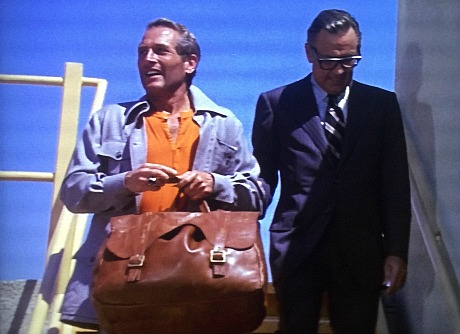
Paul Newman, William Holden in Irwin Allen’s The Towering Inferno.
Then came a semi-drunken moment on the London subway in December of ’80. It was an hour or so after midnight and I’d had a few. I had the luscious brown bag with me but for some no-account reason I left the car without it. I quickly realized my error, turned around and the doors closed. I shrieked like Michael Keaton in Beetlejuice. Old brownie, jammed with nice clothing that cost me at least $1500 or more in 1980 dollars, left the station on its way to North London. Oh what a gift that was for some lucky bloke. That’s alcohol for you, and one more reason why I’m delighted I no longer drink. My five-years-sober anniversary will be on 3.20.17.
First Award-Season Screener
Yesterday I received a slim plastic package containing Ezra Edelman‘s justly celebrated O.J.: Made in America — two discs, five parts, 464 minutes. I’ve watched the whole thing twice, I own the five-disc Bluray and the series is totally viewable on ESPN and YouTube, but it’s nice to own another way to watch it. A lot of critics will say this or that film is “required viewing” but this, trust me, is required viewing. I haven’t seen all the docs I should have by now (Anne Thompson‘s 8.25 checklist piece made that abundantly clear) but I doubt if anything will overpower the rep that Edelman’s doc enjoys.
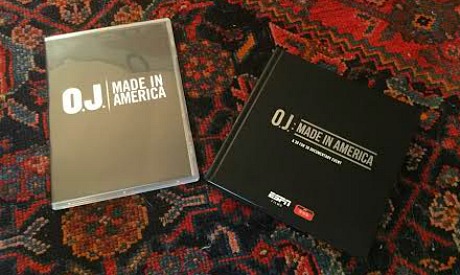
(l.) Just-received DVD screener; (r.) five-disc Bluray that I bought on Amazon.
“Yo! La La Land!”
Damien Chazelle‘s La La Land (Summit, 1.2) will premiere tomorrow night at the 73rd Venice Film Festival. The first trade reviews will pop sometime around midday in Los Angeles, maybe mid-afternoon in New York. I’ve already been told what La La Land is — a generally satisfying, richly embroidered recreation of a romantic ’50s musical with Ryan Gosling and Emma Stone trying to fill the shoes of Gene Kelly and Debbie Reynolds…or something like that.
No, stop — forget Kelly and Reynolds. Ryan and Emma have to be themselves or it won’t work. And the movie definitely has to be itself.

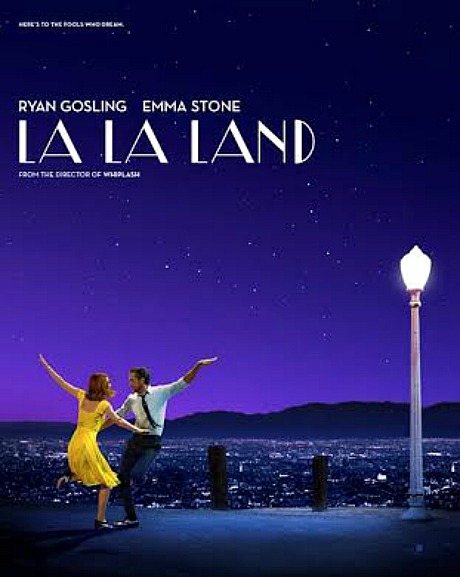
Excerpt from a Deadline/Pete Hammond interview with Chazelle: “At 31, Chazelle is a rare member of his generation who truly gets the glory of a bygone era and seems determined to make it new again. In the course of our 45-minute conversation he clearly demonstrated his encyclopedic knowledge of movies, all types of movies, and La La Land reflects that in many ways — particularly in a sequence set at a revival-house screening of Rebel Without A Cause where Sebastian and Mia meet up for a late-night date.
“[The scene] is full of melancholy and irony as it follows a dinner table conversation in which the participants discuss why seeing movies at home is far preferable to a theater these days.
“That is clearly not Chazelle’s message here. He’s old school, though he told me he realizes not everyone will warm to seeing a musical like this in this day and age. It seems to me, though, that many will be discovering something brand new and startlingly original here and will definitely relate.
Five Bumps
Every film of consequence goes through five awareness bumps before opening. The first bump is absorbing early info (title, synopsis, cast, director, producers) and maybe reading the script. The second comes with first reactions to early screenings (be they research or long-lead). The third bump is comprised of (a) reactions from people you know and more or less trust who’ve seen the film a few weeks before the opening and/or (b) reactions from festival screenings, if a festival showing is a factor. The fourth bump is general reviews, trailers, tracking, first weekend word-of-mouth. The fifth can be the most crucial — reactions from slowboat ticket buyers, second-wavers, doddering Academy types and non-geniuses. If a movie has caught on, the reactions from this last group will reflect that.
So far Warren Beatty‘s Rules Don’t Apply (20th Century Fox, 11.23) has been through bumps #1 and #2. The first reactions were “good if somewhat traditional”, but a more recent reaction from a knowledgable guy is that it’s very good and is in fact a kind of sublime bull’s-eye thing that will connect with Academy mooks. Bump #4 will happen privately in late September and October, but more particularly when his film, a Los Angeles-set late ’50s dramedy involving two employees (Lily Collins, Alden Ehrenreich) who work for super-magnate Howard Hughes (Beatty), kicks off the 30th AFI Film Fest on Thursday, 11.10. The dream or desire on Beatty’s part, I would imagine, is that under-35 types will relate and embrace given (a) the Collins-Ehrenreich casting and (b) the general theme of seeking a certain emotional serenity — a place of grace, a safe haven — in the midst of a somewhat oppressive and overbearing social system or climate.
Before My Life Began
Sometime in early ’75 I was sitting at a large round table in Izzy’s Deli (17th Street near Wilshire in Santa Monica), fretting about my future, knowing I had to make a move. It was a Saturday around 11 pm. The place was mostly filled, and truth be told I should have been sitting at the counter but I was too absorbed in my melancholy feelings to act in a considerate manner. Suddenly there was a guy with huge eyeballs standing next to me — Marty Feldman. He was with his wife (Lauretta Sullivan) and another couple. Feldman: “How are you? We were actually wondering if we might sit down?” Me (a bit taken aback): “Uhm, you’d like to sit…?” Feldman: “So we can join you!” I suddenly woke up and realized I was being selfish. Me to Feldman: “You guys take it. I’m good. No worries.” No, I didn’t say “Yo, Eye-gore!” No handshakes, no acknowledgment that I knew him. I didn’t want to be a fan.
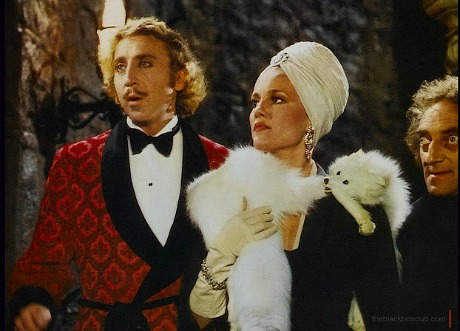
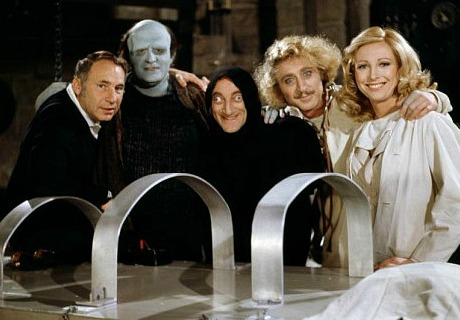
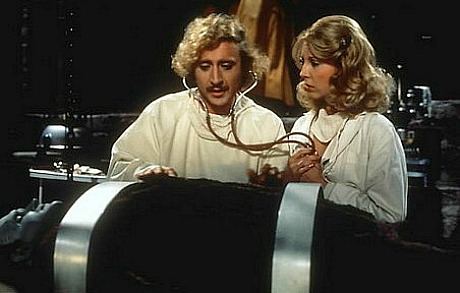
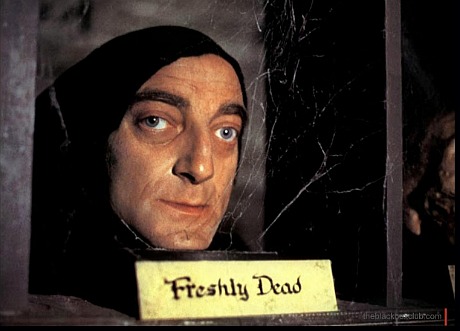
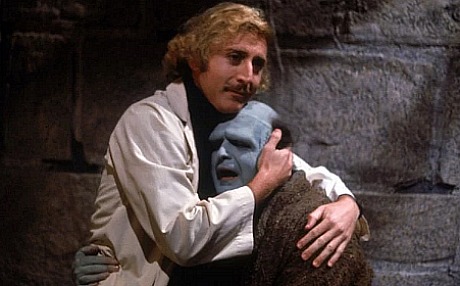
“Dumb Whore Award of 1974”
From a 7.12.09 piece called “The Art of Paycheck Acting”: “The Towering Inferno was entertaining crap when it opened 35 years ago, and the exact same deal applies now that it’s on Bluray. But Paul Newman and Steve McQueen are honorable and oak-solid in their starring roles. This is impressive given the fact that neither actor has a real part to play — they were just paid to show up and go through the Irwin Allen paces. They knew it then and we know it now, but they deliver the goods anyway. That’s professionalism and star power.
“There are four ways that brand-name actors deliver straight-paycheck performances in mediocre big-studio films. One, they do it straight and plain and cruise by on chops and charisma, like McQueen and Newman. Two, they do it straight and plain and don’t cruise by on chops and charisma — they sink into the movie like quicksand and then suffocate. Three, they behave in an extremely mannered and actorish way as a way of telegraphing to the audience that they’re totally aware that they’re in a crap film. And four, they go beyond mannered and waaay over the top (like Jon Voight in Anaconda) and turn their performances into inspired farce.”
Wilder at 80, 92Y, Three Years Ago
Born in 1933, Gene Wilder didn’t begin making films until 1966 when he played the giggly, anxious undertaker in Bonnie and Clyde (’67), at which time he was 33. No spring chicken. He had just turned 40 when he began filming Young Frankenstein in ’73 or early ’74. (Whenever.) He was 46 or thereabouts when he began working on Stir Crazy (’80). And then he quit acting after making Funny About Love (’90), at which point he was 56 or 57. he must have been coping with early Alzheimer’s disease when he did this interview with Robert Osborne at Manhattan’s 92Y in 2013.
Milkblood
All along Jonathan Nolan and Lisa Joy‘s Westworld (HBO miniseries beginning on 10.2) has seemed heavier, gloomier and creepier than Michael Crichton’s 1973 original, which had a lighthearted tone until the final act. Everyone in the current version seems to be bothered or haunted or pervy or a combination of all three. The most distinctive visual bit in the trailer is when a milk-like liquid bleeds out of a bullet hole in a robot’s stomach. Which reminds us, of course, of that moment in The Manchurian Candidate (’62) when John McGiver, playing a liberal U.S. Senator, is shot by Laurence Harvey with the bullet puncturing a milk container, etc.
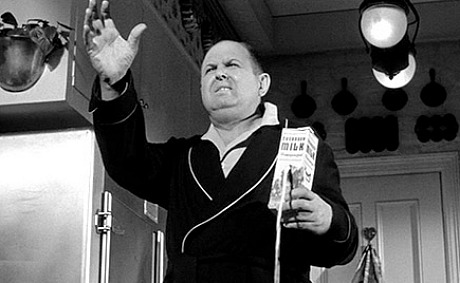
Things I Hate About The Great Escape
I got into a brief back-and-forth last night with Farran Nehme (a.k.a. Self Styled Siren) about’60s-World War II movies and particularly John Sturges‘ The Great Escape (’63), which I loved as a teenager and 20something but which has been irritating me more and more as I get older.
My basic beef is that the American and British prisoners are so casually enterprising, so smooth and cool and smug, that most of the camp scenes feel more or less like Hogan’s Heroes — i.e., doses of light attitude + mild slapstick comedy mixed with Sgt. Bilko with Germans. Stalag 17 feels much more realistic. The prisoners swagger around like cock of the walks, smirking and dispensing insults and just getting away with every stunt in the book.
The only bad thing that happens during the entire camp portion (or about 65% to 70% of the film) is when one of the three tunnels is discovered by the Germans. That’s it! No other mishaps or mistakes except for the shooting of Angus Lennie‘s Archibald Ives, except in my book that’s a good thing.
Five random irritants: (1) The German camp commanders are far too lenient with the prisoners, who after all have been put into this super-camp because they’re all disobedient bad apples with a high likelihood of trying to escape;
(2) Why oh why don’t the Germans simply post two guards inside each of the barracks so as to spot any possible digging going on?;
(3) I despise Richard Attenborough‘s Roger/”Big X” character, such that I always feel a slight pang of pleasure when he gets machine-gunned to death near the end (not that I’m happy that the other 49 other prisoners are killed but at least Attenborough has been shut up for good);
(4) I hate the Brigadoon-like Scottish accent and cute-little-guy mannerisms used by Lennie, and so I always find it gratifying when Ives gets machine-gunned to death on the camp wire;
(5) That scene when McQueen and Ives explain to their superiors how they intend to dig their way out under the fence like moles is completely absurd and not even vaguely funny, and McQueen’s delivery of his dialogue is straight out of The Honeymoon Machine.
Replies to Thoughts, Quotes from Buchanan’s Oscar-Season Piece
Kyle Buchanan‘s Vulture article about the about-to-launch Oscar season (“The Unsettled, Unsettling Oscars“) riffs every which way but basically posts the following ten intuitions or suspicions:
(1) “It’s a weird year…not that much I’m looking forward to…no one movie that I feel certain is going to get a Best Picture nomination”;
(2) The Birth of a Nation is Best Picture toast (“It was good enough for the narrative it had at Sundance, but it’s not good enough to withstand what’s happening now”);
(3) But given the general compulsion among Academy and guild members to “get their black on,” Fences and Moonlight will almost certainly benefit from Nate Parker‘s fall from the pedestal;
(4) Manchester By The Sea is “a downer for sure”…an unfounded slur as there’s a distinct difference between downer and sad (and keep in mind that Buchanan himself wasn’t a huge fan when he tweeted about Manchester last January);
(5) Buchanan believes that “if voters crave a fizzy counterbalance to Manchester, I think they’ll flock to Florence Foster Jenkins“…wrong! Except for a possible knee-jerk Best Actress nomination for Meryl Streep and a supporting actor nom for Hugh Grant, Florence doesn’t have the weight or the edge.
Wilder’s Peak Performance: Howling, Bug-Eyed, Electric-Haired, Droll, Perfect
Gene Wilder, an absolutely genius-level comic actor who fully understood the angst and anxiety of 20th Century existence and the bullshit within and who ruled and revelled for a glorious 13-year period (’67 to ’80), has left the planet. I’m very sorry but the poor guy was grappling with Al Z. Heimer. Hugs and condolences for his friends, loved ones, family, fans. Wilder was 83.
Brilliant and crackling as he was in several films during his hot streak, Wilder never quite matched his exquisitely delivered performance as Dr. Fredrick Frankenstein in Mel Brooks‘ Young Frankenstein (’74) — a film that I’ve watched at least 20 times and could easily watch another 20 for Wilder’s performance alone. Incandescent, precise, fall on the floor.
For me his career boiled down to seven key performances — the kidnapped undertaker in Arthur Penn‘s Bonnie and Clyde (67), Leo Bloom in Brooks’ The Producers (’68 — “Max, he’s wearing a dress”), the doctor who has an affair with a sheep in Woody Allen‘s Everything You Always Wanted to Know About Sex (But Were Afraid to Ask) (’72), Fredrick Frankenstein, The Waco Kid in Blazing Saddles (’74), George Caldwell in Arthur Hiller‘s Silver Streak and Skip Donahue in Sidney Poitier‘s Stir Crazy (’80).
